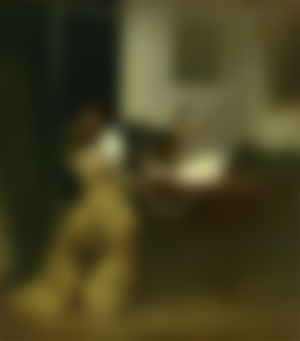One of the greatest classical composers created a violin sonata, which was dedicated to a French violinist, after whom it has been named. Actually, it was first dedicated to another violinist, but the composer changed the dedication after one performance.
A famous author, as great within world literature as the composer is in music, wrote a story with the same name.
What name?
Beethoven composed the Kreutzer Sonata (Violin Sonata No. 9 in A major, Op. 47); and Leo Tolstoy so named one of his short stories: Kreitzerova Sonata, 1889. Beethoven's sonata has a prominent position in the story.
The French violinist was Rodolphe Kreutzer, and this is Beethoven's dedication (1805): "Composta e dedicata al suo amico R. Kreutzer."
Kreutzer never played the sonata, at least not in public, he considered it as unplayable, and he claimed that Beethoven did not understand the violin.
The first performance of this piece was in 1803, and then it was played by George Bridgetower, an eminent English violinist, and the first dedication was to him. As a consequence of a personal matter, Beethoven was enraged by a remark Bridgetower had made about a woman he (Beethoven) knew; the dedication was changed, and the choice of Kreutzer seems to have been just a matter of insulting Bridgetower by honouring one of his worst competitors.
So, this sonata, one of the really great works of western music, came to be associated with a man who did not deserve it, a violinist who did not even take the pain to play the piece his name is forever associated with.
How about Bridgetower? How was his life affected? He died in poverty, in London, forgotten by everyone.
Tolstoy undoubtedly belongs to the topmost layer of world literature, but his religious or moral brooding brought him to a state where his sanity can be questioned. That does not diminish him as an author, there is a spark of insanity in every genius, but he must have been a very difficult person to deal with in real life, especially in his old days.
Kreitzerova Sonata reflects his moral brooding, and is a study in fanatic jealousy, and about the connection between sex, marriage and religion. In an epilogue, written in 1890, Tolstoy explains his message, and distances himself from much of human nature, seeing it with contempt - or with pity, more reflecting his own religious perspective.
G. K. Chesterton wrote in Illustrated London News in 1908:
"Tolstoy is not content with pitying humanity for its pains: such as poverty and prisons. He also pities humanity for its pleasures, such as music and patriotism. He weeps at the thought of hatred; but in The Kreutzer Sonata he weeps almost as much at the thought of love. He and all the humanitarians pity the joys of men."
Then he says, as speaking direct to Tolstoy:
"What you dislike is being a man. You are at least next door to hating humanity, for you pity humanity because it is human."
Life inspires art, but so does art. What I mean is that a work of art can inspire another artist to another work of art, and it can go on in several steps. The Kreutzer Sonata serves as a good illustrative example.
Beethoven's work inspired Tolstoy; the sonata has a prominent place in the story, and Tolstoy used it as a title of his novella. His novella, in turn, has been used as a theme in several films and theatre plays, even a ballet. That, however, might be seen as various interpretations rather than new, independent works of art.
However, let's take this a step further; Tolstoy's story inspired Czech composer Leoš Janáček to his String Quartet No. 1 (1923), which is informally called the Kreutzer Sonata. It also inspired him to a Piano Trio.
It is quite interesting how music inspired to literature, which, in turn, inspired to music. But we are not limited to these 2 forms of art. In 1901, René-Xavier Prinet made a painting, Kreutzer Sonata, with a scene from Tolstoy's story. (Image below. Public Domain.)

Incidentally, it is hard to find any artist who has inspired so many other artists as Beethoven, also outside his specific artistic field (music). Both he, as a person (or the myth about him as a person), and his music, seem especially appealing to authors. But that is a topic for another time and another article.
Copyright © 2021 Meleonymica/Mictorrani. All Rights Reserved.
Here you can find my articles about History, Literature, Art and about Music.
Interested in history, legends and myths, join my community History, Myths, Legends & Mysteries (be45).
You find all my writings on Read.Cash, sorted by topic, here.
Resources:
Beethoven's Violin Sonata No. 9 in A major, Op. 47, the Kreutzer Sonata:
https://www.youtube.com/watch?v=COGcCBJAC6I
Tolstoy's Kreutzer Sonata, as audiobook:
https://www.youtube.com/watch?v=-860B1zH0eM
The Kreutzer Sonata and Other Stories by Leo Tolstoy, as ebook:
https://gutenberg.org/ebooks/689
Leoš Janáček, String Quartet No. 1 "Kreutzer Sonata":

Wow, this is so well written and I don't why but I feel the way you tell it is like I'm a kid sitting on the floor in a library listening you speak about how enchanting Art is and how it connects, I'm in awe, starry eyed and hanging to your every word. Also, I feel bunch smarter as an artist after I read this haha I would like to read more about Art/paintings/music from you, have a great one! Eve